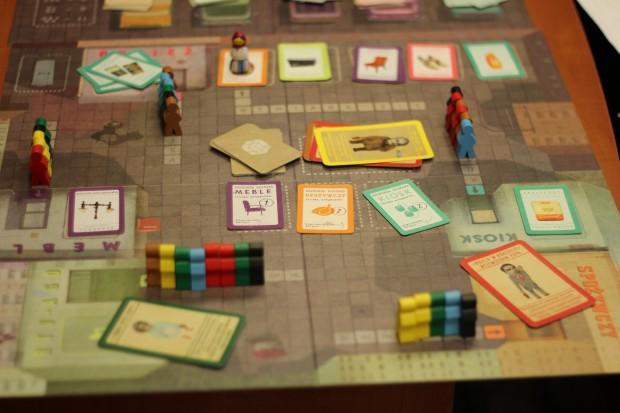Playing To Win In 1980s Poland
Board game, “Kolejka” harkens back to everyday life in Poland at the end of communism. (Photo: Liam Nolan)
By Liam Nolan
'Kolejka', aka Queue, looks back at the 1980s, when Poles waited on lines to buy basic supplies.
The country's Institute of National Remembrance created the game two years ago to teach young Poles about the realities of life in Communist Poland.
The game sold out the first day it went on sale.
At first glance, it looks like Monopoly. But this isn't a board game about buying and trading property. The point of the game is to buy all of the items on your family's shopping list — things like bread, ham and toilet paper.
The first one to get everything on their list wins the game.
It's actually a lot of fun.
My wife and I attempted to play the game. You have to stand in a queue to purchase anything.
Today's capitalist Poland seems a world away from Poland of the 1980s so you could imagine my surprise when I heard that this board game is not a computer game.
Kolejka has become a cult hit among Polish families.
Game creator Karol Madaj works in the Bureau of Education at Warsaw's Institute of National Remembrance. He's 33 and old enough to remember what it was like in Communist Poland.
"When I was a kid, I stood in lines with my mom and when I was a little older, she would sometimes send me to line up on my own I remember the lines had a certain feel and I wanted to emphasize this in the game," he said.
He says the game works best when you play it with parents or grandparents because they can tell you stories about the 1980s. Young people can learn about the Solidarity movement and why there were strikes. So I took Karol's advice and asked my Polish language teacher Jolanta Czajkowska and her husband to take a trip back to the early 1980s with their three kids.
Playing the game has highlighted some generational differences for Jolanta. "Maybe we are more competitive. I suppose nowadays the new generation wait for something. Wait for a job, for school for something, but we were more competitive."
Czajkowska's daughter Roza, 9, thinks it's an interesting game. "I didn't know that people lived like this. I can always get things at the local market and can't imagine what life would be like if it wasn't there."
For Jolanta's husband, Robert, playing Kolejka brought back memories.
"When I was about 15, I remember going to buy vinegar with my uncle. We walked a mile to the bus stop, then we travelled 25 miles by bus and bought three bottles of vinegar each. Vinegar was useful for preserving mushrooms. Apart from the vinegar, there was nothing else in the shop. But we felt we'd succeeded because we managed to buy some vinegar."
"Our childhood is completely different from the childhood of our children. They are very happy I suppose and they don't appreciate this… definitely. But on the other hand we have very nice stories to tell everyday," said Jolanta.
The 6th edition of Kolejka went on sale a few weeks ago. And predictably, the queue was quite long.
